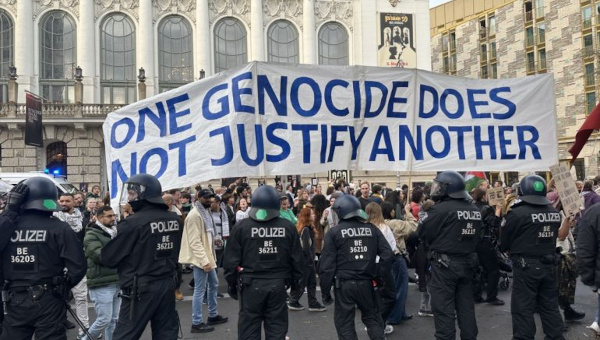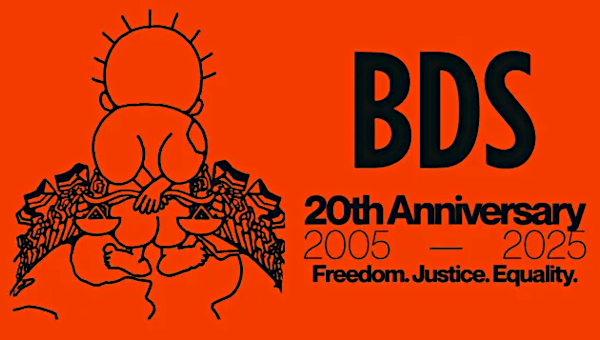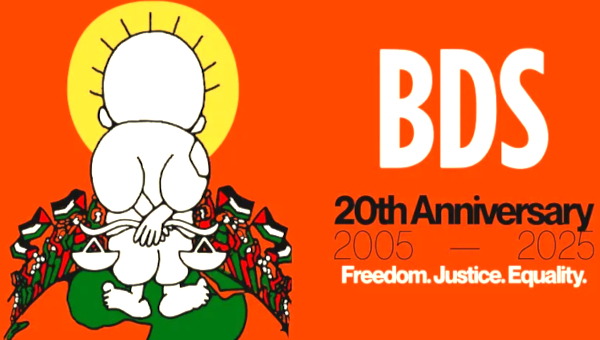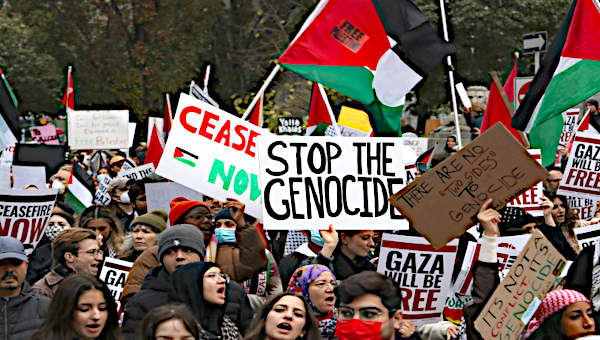Kadima’s Black Flags and Israel’s Image Problem
Israel is currently experiencing an internationally visible collapse of its ‘liberal democratic’ camp, raising significant problems for a state whose underlying theocratic and apartheid features have historically been partially covered from international view by liberal democratic pretenses.
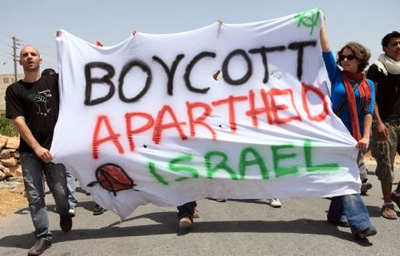 Given that the governments of Greece and Italy are apparently being seized for direct political rule by the financial system, one might suggest that dispensing with democratic niceties is the international order of the day. Perhaps, then, Israel won’t find itself all that isolated after all. But it might. In any case, developments in Israel and the commentary that they have triggered should provide the opportunity to forcefully brush aside any lingering illusions about Israeli establishment ‘moderation.’ Such illusions are little more than an unfortunate hangover from years gone by, when Israeli colonial rule found unlikely allies even among ostensible Western progressives.
Given that the governments of Greece and Italy are apparently being seized for direct political rule by the financial system, one might suggest that dispensing with democratic niceties is the international order of the day. Perhaps, then, Israel won’t find itself all that isolated after all. But it might. In any case, developments in Israel and the commentary that they have triggered should provide the opportunity to forcefully brush aside any lingering illusions about Israeli establishment ‘moderation.’ Such illusions are little more than an unfortunate hangover from years gone by, when Israeli colonial rule found unlikely allies even among ostensible Western progressives.
The Authoritarian Challenge to
Ariel Sharon’s Democracy
The English-language webpage of Ha’aretz, Israel’s daily ‘newspaper of record,’ offers an
interesting view of the sinking ship that is liberal Israeli hypocrisy. The site currently features a section titled ‘Project
Black Flag,’ borrowing the imagery from the Israeli legislature’s Kadima opposition, whose representatives demonstratively waved black flags in the Knesset earlier this month in protest against the current wave of authoritarian legislation being pushed through by Israel’s governing coalition. (Kadima, recall, is the party launched in 2005 by Ariel Sharon and continuing to champion his legacy.) Below, I’ll turn to some of the noteworthy associated
commentary. First, its ideological and strategic context deserves some sustained attention.
Historically, the ample Western arms, economic backing and political-diplomatic cover that have enabled Israeli actions were given to an Israel that was widely understood to ‘shoot and cry.’ Wars were forced upon it by nefarious enemies, and whatever abuses occurred during Israel’s valiant self-defence were committed with a pained restraint. “We can forgive the Arabs for killing our children,” Golda Meir is quoted, ad nauseam, as explaining to the world. “We cannot forgive them for forcing us to kill their children.” Incidentally, that ‘the Arabs’ (or the IHH, or whatever other designated enemies of Israel) are to blame even for Israeli atrocities remains a familiar theme of Israeli diplomacy – and maddeningly, variations on this theme are often echoed by many people who really ought to know better. Israel, anyway, internally distraught at what it was being forced to do, featured in this story as a brave but enlightened character beset by difficult dilemmas, both strategic and moral.
An exaggerated and idealized projection of the pluralism internal to the Jewish Israeli political system has been internationally exploited to destructive effect for many decades. This has been widely observed by critical observers of the U.S. and Israeli political scenes. In his 1983 tome concerning U.S. policy and the Palestine question, Noam Chomsky, for example, expressed his usual understated disgust at this spectacle. In the aftermath of the horrendous massacres in 1982 Lebanon, Chomsky observed, U.S. Congressional liberals leveraged signs of dissent within Israel (which were largely driven by the tactical opposition of the Israeli Labour Party) to justify further increases in U.S. aid to finance Israeli military power and settlement construction.
Israel, so the logic went, was proving itself to be a vibrant democracy. Chomsky wrote: “Presumably there is … a lesson here as to how to obtain further victories in Congress. It would be interesting to know how the reported 400,000 people who demonstrated in Israel in protest over the massacres will react to the fact – and fact it is – that the practical outcome of these efforts, given the way things are in the United States, was to accelerate the militarization of Israeli society and its expansion into the occupied territories.”[1] Unfortunately, judging from recent Israeli ‘moderate’ commentary, there is reason to suspect some may have been quite satisfied.
Idealized exaggeration of Israeli pluralism has long been very widespread indeed, even in critical circles. For example: “One often hears statements,” as the late Tanya Reinhart observed, interpreting the detailed accounts of state policy available in Israel’s press “as signifying that the Israeli media is more liberal and critical of Israel’s policies than other Western media. This, however, is not the explanation.” More to the point, she explained, it has less reason to be inhibited: “Things that would look outrageous in the Western world are in Israel considered natural daily routine.”[2] Nonetheless, so suffocating are the terms of discussion of Palestine in the West that critics are sometimes tempted to latch on to even the most morally bankrupt tactical dissent within the Israeli establishment to legitimize their own opposition.
This reflex serves to build up unrealistic expectations concerning prospective challenges to Israeli colonial rule from within the Jewish Israeli political system, to derail serious analysis and principled strategy, and sometimes to downplay the need for international action. Worst of all, it can take the form of ‘moderate’ opinion in the West demanding that Palestinians simply try to partner with ‘moderate’ Israeli establishment opinion – in other words, demanding Palestinian acquiescence to colonial rule (in thinning ‘peace process’ packaging) in a spirit of false internationalism. Palestinian resistance politics can then be dismissed if they fail to orient themselves toward dialogue with the increasingly elusive force that is the Israeli ‘peace camp.’
For at least some leading Israeli intellectuals, the strategic value of such distortion is
apparent. An Israel that appears to ‘shoot and cry’ is understood to be better positioned to keep receiving the arms, economic backing and diplomatic cover necessary to keep firing than one that shoots and cheers. Hence the current dilemma.
Ilan Pappé identified from the late 1980s as one of the Israeli ‘new historians’ who challenged established Zionist orthodoxy, recounts an instructive exchange he had in the 1990s with a colleague at Haifa University, Arnon Sofer – a rather iconic ‘organic intellectual’ for the forces of racist Israeli demographic management. Pappé cites Sofer as explaining: “Between you and me, within four closed walls, you are one of us. But it is good that you are beautifying Israel’s image abroad.”[3] In Pappé’s case, such exchanges were predictably and definitively cut off by his political record in the ensuing years. They nonetheless reveal much about the outlook of advocates (à la Sofer) of an internationally palatable Israeli colonialism.
The visible rightward shift of Israeli politics is causing considerable unease in such quarters (as expressed in the recent commentary of Ari Shavit, sampled below).
A Fight That Liberals Can’t Easily Win
The political dynamics that have set Israel on its current political trajectory deserve serious consideration. Indeed, within the Jewish Israeli political arena, on purely logical grounds, one
can understand why the contest between unapologetic ethno-religious chauvinism and liberal Zionist hypocrisy is gradually being resolved at the expense of democratic pretense.
People interested in this contest (and prepared to plug their noses while facing an icon from each side) ought to watch the 1985 debate, available online, between Harvard
University’s Alan Dershowitz and Rabbi Meir Kahane. For those without the nose plugs or stomach for the video, I’ll review a few relevant highlights.
Dershowitz (now here’s a real shock) offers little of original interest. Kahane, on the other hand,
represents an interesting phenomenon. Since this debate finds Kahane in what for him constitutes good form, and at what for him most closely approximates good behaviour, I feel compelled to emphasize that this is a man who really does personify caustic, fascist venom (videos where he quite transparently expresses a visceral, hateful glee at the mass killing of Palestinians are also widely available). An open advocate of theocracy, violent expulsions and indiscriminate killing of civilians, Kahane explicitly urged his adherents to carry out paramilitary attacks against Palestinians along these lines, and many did and do (for his part, Kahane was assassinated in late 1990).
What is interesting about Kahane for present purposes is the way, rare if not unique, in which he presents the unapologetic Zionist case against liberal hypocrisy to an English-speaking audience. Notably, one can see – not in Kahane’s career or organizational work, which I won’t dwell on here, but in the logical course of the argument – the way in which he uses the consensual political Zionist demand for a Jewish majority state in the former Palestine to undercut the principled political basis for any genuine democratic opposition. While I do not wish to simply conflate the two, it is precisely the congruence of Kahane’s politics with Israel’s established political mainstream that makes the former at once dangerous and revealing.
I’ll confine this brief review of Kahane’s comments to two issues: (1) the indiscriminate killing of
Palestinian civilians and (2) the contradiction between democracy and the consensual political Zionist commitment to racist demographic management.
(1) Asked about instances in the preceding period in which his adherents indiscriminately killed
Palestinians in the occupied West Bank, Kahane positions these actions within (albeit toward the right of) the established Zionist canon. He explains:
“Innocent people? This is a picture of a man named David Raziel [Kahane shows a portrait of Raziel]. He’s a national hero in Israel. There is a village named after him, Ramat
Raziel. Streets in Jerusalem, in Haifa, in Netanya, named after Raziel. Do you know who this hero was? There’s a stamp – a stamp! – in Israel with his picture on it. You know who David Raziel was? He was the head of the Irgun in the 1930s … David Raziel, the national hero of Israel, planted a bomb in the Arab marketplace in Jerusalem. It went off and it killed 27 Arabs.”
Those who continue in this tradition, Kahane later urges, should be fully supported by state forces:

Fascist slogans in Israel.
“it’s a tragedy that those Jews took the law into
their own hands. It was the job of the government of Israel to do
what they did. … those so-called ‘terrorists’ were attempting
to put the fear of God into the Arabs. Because the only thing that
the Arab will ever understand is fear.”
(Consider: to what extent does this sentiment fundamentally differ from official ‘deterrence’ thinking?)
(2) More revealing, in many ways, are the exchanges between Kahane and Dershowitz on Arnon Sofer’s intellectual stomping ground: state management of the demographic balance in territory governed by Israel. This is among the central defining axes of Israeli politics, and its treatment during the debate is extremely illustrative.
In short, Dershowitz’s rhetorical flailing and Kahane’s forthright rebuttal stand together as a
telling display of the pummeling that ostensible liberalism is likely to face in honest, principled debates that assume shared political Zionist premises (especially on the question of ‘demography’).
The debate moderator poses (1:00:49) a basic question: Do “the Arabs” have the right “to become the majority in Israel” and “by democratic and peaceful means” to challenge the state’s Jewish character?
Loathe to really admit Palestinians into such important ‘in-house’ debates, Dershowitz responds by
immediately reframing the matter. Dershowitz begins:
“We don’t even have to reach that issue: what if Jews decide by democratic principles to vote against principles that Rabbi Kahane holds sacred? What if Jews tomorrow were to vote to repeal the Law of Return [which guarantees any Jew defined as such by the state to gain immediate citizenship and residency rights]? I would fight tooth and nail against that … But Israel is a democracy. And if Rabbi Kahane and I, together, fail in our efforts to persuade Jews to maintain the Law of Return then we will have lost our fight for democracy. … We have to fight that [demographic] battle, we have to look at it as a challenge.”
In facing this challenge, Dershowitz suggests that it is actually Kahane who undermines the Judaization of Palestine by advocating a Halachic (Jewish theocratic) regime which will dissuade Jewish immigration and settlement from abroad. Thus, Dershowitz asserts, a liberal democratic Zionism provides the sturdier defense against the threat posed by indigenous Palestinian demography (i.e., resident existence).
Kahane replies:
“I must say that was impressive. Dr Dershowitz took four minutes brilliantly not answering the question. The question wasn’t whether it was a challenge. Of course, it’s a challenge; agreed, it’s a challenge. The question was: Assuming the Arabs ‘beat’ us, would you be willing to accept that? The question is, Do they have a right to be a majority, in theory? Under democracy, of course they have that right! Under Zionism – not religious Zionism, but the Zionism of a man named Herzl, who wrote a book called The Jewish State – of course they don’t have that right.”
Underpinning Kahane’s polemical strength are the basic points of contact between
his caustic calls for anti-Palestinian action and the policies of Israel’s founding Labour Zionist mainstream. “We have,” Kahane declares to the audience,
“to face up to truth. We have to face up to so many truths. Among which is that Ben-Gurion, when he was the prime minister, didn’t allow an Arab to leave his village at night without a special pass [recall that Palestinian citizens of Israel faced military governance from 1948 through to 1966]. Which I think is a magnificent example of democracy.”
Likewise, albeit in a somewhat roundabout way, Kahane reminds the audience that debates
about demography, ‘population transfer’ and exclusion of Palestinian refugees were not simply triggered by post-1967 Israeli policy in the West Bank and Gaza or the associated fundamentalist settler camp. “There’s not one Arab refugee living in Lebanon who comes from the West Bank,” he emphasizes. “Every single one comes from the Galilee, from Haifa. There’s not one Arab refugee in Gaza who comes from the West Bank. Half of them come from Jaffa, and from Ramle, and from Lydda, and from Be’er Sheva, and from what is now Ashdod and Ashkelon [all locations from which Palestinians were ethnically cleansed in 1948].” Kahane’s point, for all the nominally defensive rhetoric with which he packages these remarks, is that if Israel accepts liberal democratic premises “there will be a Law of Return for Arabs – and rightly so, under democracy.” Therefore, pursuit of consensual political Zionist aims is taken to require a rejection of democratic norms.[4]
The relative coherence of Kahane’s politics in this debate when compared to the
rearguard tactical arguments made by Dershowitz is, in strategic terms, more apparent than real. Kahane’s doctrinal rigidity (especially combined with articulate Brooklyn English) involved an
assault on the enlightened liberal pretenses that have greased Israel’s arms procurement machinery in the West since the state’s inception. In an earlier era, David Ben-Gurion famously derided the politics of the Zionist right – specifically, those of Ze’ev (Vladimir) Jabotinsky and his Revisionists – as ‘verbal maximalism.’ To speak publicly of aggressive objectives at the expense of building the international support needed to realize them was, for Ben-Gurion, a novice move and a marker of political naivety.
Nowadays, concern for the possible ideological discomfort of Western patrons is
apparently weakening as a constraint on the terms of Jewish Israeli political discussion, and the genuine sway of liberalism is eroding even more visibly.
‘Kahane Is Smiling’
Gideon Levy is one of those rare Israeli journalists who has staked out a position of genuine democratic opposition to state policies. Among his many periodic pieces with a standard unifying theme – ‘damn, mainstream Jewish Israeli politics are a disaster that just keeps getting worse’ (I paraphrase) – was an article published during Israel’s most recent elections and titled simply, “Kahane won.” A recent Ha’aretz news report (November 16) picks up on the same theme.
Describing this month’s Jerusalem rally marking the anniversary of Kahane’s assassination, where “euphoria gripp[ed] the massive crowd,” the
reporter samples some of the video entertainment charging the “jubilant” atmosphere:
“Clip after clip that had aired on Israel’s commercial television stations over the last year was shown on the big screen of the Heichal David hall in Jerusalem’s Romema neighborhood. There was a report broadcast by Channel 10 just two days ago about Ariel Zilber’s new song, ‘Kahane was right.’ A Channel 2 report that praised longtime [Kahanist] activist Itamar Ben-Gvir as a ‘skilled media machine’ and ‘a kind of celeb’ … Then back to Channel 2, which showed [National Union MK Michael] Ben-Ari explaining how he would respond to rocket fire from the Gaza Strip: ‘24 hours, and there would be no more Beit Hanun [a city in northern Gaza which has been especially hard hit by indiscriminate Israeli artillery fire].’ The crowd went wild. ‘Today, Rabbi Kahane is sitting in heaven and smiling,’ Ben-Gvir told the audience. … ‘Today, it isn’t just Ben-Ari,’ Ben-Gvir noted. ‘In Yisrael Beitenu, in National Union, even in Likud they understand that Kahane was right.’’
In earlier decades, the idealized international image of internal Israeli politics helped to colour perceptions of such displays. Consider the best known massacre of Palestinians by a follower of Kahane’s teachings: Israel Defense Forces (IDF) physician Baruch Goldstein’s February 1994 shooting spree in Hebron’s Ibrahimi mosque, which killed 29 Palestinians and wounded another 150. An important poll, relayed by an Israeli commentator in the immediate aftermath of the killings, “established that at least 50 per cent of Israeli Jews would approve of the massacre, provided that it was not referred to as a massacre but rather as a ‘Patriarch’s Cave Operation,’ a nice-sounding term already being used by religious settlers.” The commentator noted that this exposed as false mythology the notion that “with the exception of a few psychopaths, the entire nation, and its politicians included, has resolutely condemned Dr Goldstein, even though, luckily for us, all major television networks in the world were last week deluded by this
untruth.”[5] But crucially, the myth for the most part held.
Following the 1994 massacre, the Yitzhak Rabin government sealed the occupied West Bank and Gaza, repressed the ensuing wave of Palestinian protests (killing 33 Palestinians in the process), and put the Palestinian population of Hebron under a nearly six-week curfew to protect the settlement of Kiryat Arba (the messianic scourge which terrorizes Hebron, and in which Goldstein had resided); Rabin then moved on to join in accepting the 1994 Nobel Peace Prize.[6] This is a balancing and juggling act for which the Israel of Binyamin Netanyahu is less well suited.
Today, the main organizations of the Jewish Israeli establishment ‘left’ are not only weak on
principle (recall Labour Party leadership of the Defense Ministry that managed the assault on Gaza in 2008-9, and Meretz Party support for the Israel Air Force massacres that opened the campaign), but are also in disintegrating electoral freefall and facing a striking loss of their public influence. The implications of the possible collapse of the liberal Israeli establishment’s domestic political sway are too numerous to even try to list here. (Those interested in details can peruse Haaretz’s so-called ‘Project Black Flag.’) Here I’ll wrap up by sampling some strategic concerns expressed by veteran commentator and Ha’aretz editorial board member Ari Shavit.
Shavit, in his way, is attuned to global power relations and Israel’s place within them. Early this
year, as Egyptian popular rebellion challenged the Hosni Mubarak
dictatorship, Shavit mused:
“Following half a century during which the Arab world has been governed by dictators, the rule of tyranny is cracking at the seams. The Arab masses are no longer willing to suffer.”
That the Obama administration did not rigidly support Mubarak’s rule in the face of this crisis was, for Shavit, a ‘betrayal.’ “It could be that the American empire was evil” in its reign over the past several decades, Shavit explained, but it has been beneficial for many and relied on a
base of Third World ‘fear’ and ‘obedience’ that the U.S. leadership is not doing a good enough job of maintaining.
Only time will tell whether the Obama administration’s attempt to maintain basic strategic military and political-economic continuity in Egypt without Mubarak’s personal participation will succeed in the face of the impressive popular resilience and courage on display in Egypt’s streets and factories, but one needs to be a truly callous hack to consider these developments from the vantage point of imperial strategy. Just to give a sense of where Shavit’s coming from.
This month, with the Israeli far right on a triumphant and internationally visible march through the Israeli mainstream, Shavit decries the fact that ‘Israel’s enlightened elite’ seems to have ‘lost its public hegemony.’ While the forces of populist chauvinism may revel in this turn of events, Shavit pleas, their international implications cannot be ignored. “Israel’s alliance with the United States and Europe is based on shared values, and harming these values will erode the alliance.”
Shavit continues:
“…without the elite of Rehavia, Ramat Aviv and Ra’anana, Israel would have no existence. Without left-wing scientists, left-wing intellectuals and left-wing high-tech entrepreneurs, Israel would be a backward country, weak and pathetic. It would not be able to rule over Judea and Samaria [the biblical designation for the West Bank], it would not be able to defend itself [!] against Iran, and it would not survive in the storms of the Middle East.”
Standing on such fine and noble principle, it’s no wonder that politics the likes of Shavit’s are facing a possible domestic collapse.
Conclusion
Internationally, we also need to face up to some obvious truths. One of which is that the problem is not merely the Meir Kahanes and Avigdor Liebermans. There exists a grim and ominous continuity running from the explicit articulation by legal representatives of Israel’s Kadima-Labour coalition of ‘economic warfare’ against the people of Gaza at the outset of 2008; through to the spoiling of 50,000 infant vaccines in April of that year, as even the general storage unit of Gaza’s Health Ministry was starved of fuel; and on to the deployment against Gaza at year’s end of soldiers among whom t-shirts soon circulated featuring a veiled, pregnant woman, her belly targeted in the crosshairs of a rifle, alongside the slogan “one shot, two kills.”[7]
That ongoing shifts in Jewish Israeli politics are increasing the clout of unabashedly genocidal political forces is very dangerous. The upsurge of democratic resistance to the regional order that has developed since the ‘Arab spring’ is, for its part, being variously interpreted in Israel (to take another pair of Ha’aretz articles from the past week as examples) as a deterrent to aggressive Israeli action and a possible trigger for it. But however these dynamics play themselves out, the burden of containing the Israeli threat cannot be forced solely upon those targeted by Israeli nuclear warheads.
For Israeli planners, the prospect of an erosion of Israel’s base of support in the West continues to function as a deterrent to escalating crimes – albeit, for now, a fairly weak and unreliable one. For those of us in the West, ongoing efforts to attach tangible social costs to the current course of Israeli policy are thus the priority.
The movement for Boycott, Divestment and Sanctions
has done much to expand and enrich efforts in this direction. I’ll not contribute much of substance here to the necessary accompanying strategic discussions, but will
briefly point out a couple of political traps that should be avoided.
The first, in light of the above, is an exaggeration of the pluralism of the Jewish Israeli political scene or excessive reliance on the dissidents within it. In earlier decades, critics in the West often suggested that identification with Jewish Israeli peace forces was an advisable means of engaging with the Palestine question (a politics that partially overlapped with the prominent public role of high-ranking dovish veterans of the Israeli military establishment in countering right-wing opposition to the ‘peace process,’ especially in the United States). There are of course genuine democratic movements doing important work under difficult circumstances in the Jewish Israeli political arena, mostly outside of the established ‘peace camp.’ But those oriented toward the deteriorating terms of Jewish Israeli political discussion are, in the main, not positioned to constructively set the tone for critical international debate.
The second possible trap is an unhealthy fixation on Jewish dissent in the West. This is an awkward issue which I will only touch on briefly here. But the flip side of ongoing attacks on Palestinian citizens of Israel as fundamentally external to the Israeli polity is the state’s orientation toward those, abroad as well as resident, whom it defines as Jewish. Whether or not the current proposed legislation
codifying “Israel’s status as the nation-state of the Jewish people” passes, this is part of the
Israeli political system’s basic orientation. Some quick points: It is necessary to develop a political climate of organized opposition that challenges both established Israeli state structures and the international organizations attached to them (e.g., the Jewish Federations of North America). Such opposition needs to be guided by an understanding that these formations do not truly represent the constituencies in whose name they claim to act (i.e., Jews everywhere; in this regard the overlap between predominant Zionist and anti-Semitic doctrine is striking). However, while specifically ‘Jewish’ oppositional politics will be a necessary part of this process, they are best positioned as a very narrow part of the broader challenge that is required.
On principle, a careful approach here is necessary. If we reject, as we ought to, the
idea that Jewish identity (as defined by whatever clerics) should bestow upon an individual social and political rights in Palestine/Israel that trump those of the country’s indigenous people, then we ought also to challenge the legitimacy of any political weight that accrues to an individual’s political positions by virtue of this definition. And anyway, for good reasons, this particular kind of identity-based oppositional politics suffers from some basic strategic weaknesses that will inevitably limit its strength. Fixation on Jewish dissident politics can thus simultaneously skew dynamics within our movements, limit the scope and integrity of oppositional work on the Palestine question, and reproduce a new dead end in the tradition of automatic deference to the Israeli ‘peace camp.’ Discussion of how to avoid this trap needs to be pursued seriously, but elaboration of the issue is for another place.
The fundamental point is this. The “almost total silence about Zionism’s doctrines for and treatment of the native Palestinians” in ostensibly enlightened Western circles was, as Edward Said put it, “one of the most frightening cultural episodes” of the 20th century.[8] Broad and coordinated effort will be required to overcome its effects. In the face of the ongoing surge of unapologetic chauvinism within Jewish Israeli politics, no illusions about Israel’s internal political scene should linger or be allowed to calm international concerns. Given the established character of the Israeli leadership, the character of the domestic pressure it faces, and the balance of power between Israeli state forces and the Palestinians, intense concern is called for. At the very least, this moment should prompt some left ‘house-keeping’ through which allied hesitation in challenging the Israeli political system, as a system, is cleared away.
There are hopeful signs that the growing movements against austerity and for an expansion of social and democratic rights are incorporating critical engagement with the Palestine question within their development. No advocate for equality can support an Israeli state drifting toward theocracy and employing battlefield techniques against civilian populations in ‘defense’ of an anachronistic colonialism. The international political space opened by the crumbling of liberal Israeli mythology should be filled with unflinching popular demands for equality, in Palestine as elsewhere. •
Endnotes:
1.
Noam Chomsky, The Fateful Triangle: The United States, Israel and the Palestinians (Boston: South End Press, 1983 & 1999), p. 110.
2.
Tanya Reinhart, The Road Map to Nowhere: Israel/Palestine Since 2003 (London: Verso Books, 2006), pp. 9-10.
3.
Ilan Pappé Out of the Frame: The Struggle for Academic Freedom in Israel (London: Pluto Press, 2010), p. 30.
4.
For context and details on the politics of ‘transfer,’ in particular, see Nur Masalha, Expulsion of the Palestinians: The Concept of ‘Transfer’ in Zionist Political Thought, 1882-1928 (Washington: Institute for Palestine Studies, 1992) and A Land Without a People: Israel, Transfer and the Palestinians, 1949-96 (London: Faber & Faber, 1997); and Jonathan Cook, Blood and Religion: The Unmasking of the Jewish and Democratic State (London: Pluto Press, 2006).
5.
For further citations and details see Israel Shahak and Norton Mezvinsky, Jewish Fundamentalism in Israel (London: Pluto Press, 1999), pp. 99-108.
6.
Graham Usher, Palestine in Crisis: The Struggle for Political Independence after Oslo (London: Pluto Press in association with the Transnational Institute and the Middle East Research & Information Project, 1995), p. 20.
7.
Michele K. Esposito, ‘Quarterly Update on Conflict and Diplomacy, 16 February – 15 May 2008’, Journal of Palestine Studies (vol. 47, no. 4), p. 124.
8.
Edward Said, The Question of Palestine (New York: Vintage Books, 1979 & 1992), p. 113.


